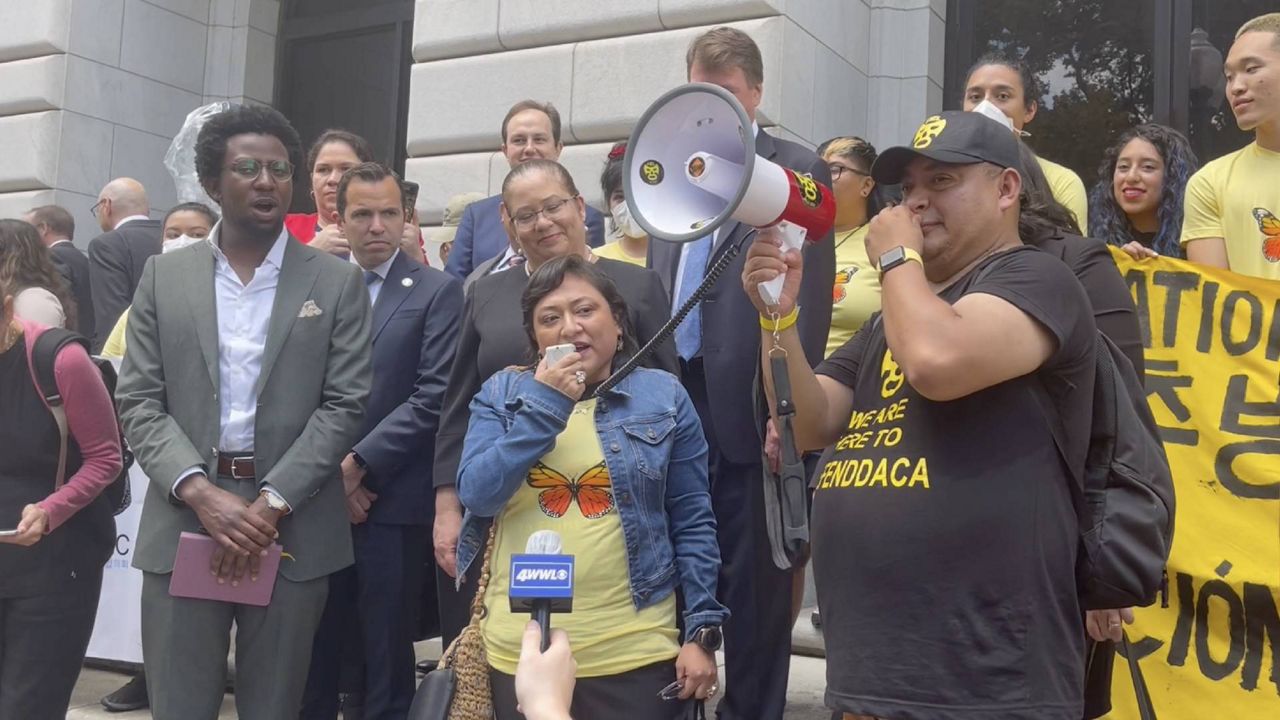NEW ORLEANS — Karina Ruiz de Diaz stood with a cheering crowd on the steps of the Fifth Circuit Court of Appeals in New Orleans on Wednesday morning, pledging to continue her fight to create a pathway to citizenship for a generation of Dreamers.
Ruiz de Diaz, a mother with her own three children, had to watch her own father die in Mexico — far from her family in Arizona — unable to see his family for two decades. Her mother, also in Mexico, has never had a chance to hug her grandchildren.
“I could get citizenship tomorrow but that doesn’t bring my dad back, to have that moment with my family,” Ruiz de Diaz, who leads the Arizona Dream Act Coalition, said, close to tears. “Our lives are on the line. We will fight it to the teeth. We will defend it, whatever it takes. We will continue to defend DACA.”
Former Pres. Barack Obama gave a generation of Dreamers — undocumented children brought to the United States by their parents — the right to step out of the shadows. The Deferred Action for Childhood Deportation, issued in 2012, swept away possible deportation and gave close to 700,000 non-resident adults the chance to have driver licenses, earn degrees, take jobs and raise their own families in peace.
Six years into the policy, Texas challenged DACA, saying it has caused harm to the state. If the state can prove it is harmed by the policy, it has what is legally referred to as standing. Lower courts have agreed Texas has standing to overturn DACA; DACA advocates disagree and appealed the decision to the Fifth Circuit Court of Appeals in New Orleans.
A conservative three-judge panel — Priscilla Richman, former Texas Solicitor General James Ho and Kurt Engelhardt — questioned DACA advocates closely on the standing issue. Pres. Joe Biden’s Department of Justice — unlike predecessor Pres. Donald Trump — sides with DACA supporters and has argued Texas has failed to quantify harm.
“Because of the way the plaintiffs have attempted to show standing, they necessarily have to show that DACA causes more people to be in the United States and that if DACA were rescinded, these people would voluntarily leave the United States,” Assistant Attorney General Brian Boynton argued. “That’s the only way they get to a decrease in expenditures. And they’ve not made that showing. They have not put in any credible…”
“You all had,” Ho interrupted. “That’s the Wong survey. (Texas) didn’t need to have the evidence because — I’m not saying the United States — (DACA supporter) New Jersey did. They don’t need to present evidence when you guys presented it for them.”
The Wong survey, cited by New Jersey, is an ongoing survey of undocumented young adults by University of California-San Diego professor Tom Wong. Advocates cite the survey for Dreamer contributions made to society; opponents talk about a question in which 20 % of those surveyed said they would consider returning to their home country.
Boynton argued the question was phrased so vaguely that it couldn’t be considered a hard commitment from Dreamers to return to their home country. Attorney Nina Perales of the Mexican American Legislative Defense and Education Fund, MALDEF, later argued the standing issue never should have been decided because advocates disputed some of Texas’ stated facts.
“The allegation was labor market distortion as a result of DACA recipients in Texas, who are less than one-third of 1 percent of the Texas population getting work authorization and becoming employed,” said Perales, who represents DACA recipients who have intervened in the case. “But the District court itself found that there was a fact dispute whether there was a labor market distortion.”
The only fact the District Court could conclude was that the existence of DACA led to a larger eligible workforce in Texas, Perales said. Recipients of DACA were in the country long before the policy was implemented; many barely remembered their home country.
The judges — and especially Ho — appeared to question whether DACA supporters had made their case. Prior court decisions also have supported the deportation of parents under a similar policy, known as Deferred Action for Parents, referred to as DAPA.
DACA recipients on the steps of the Fifth Circuit rallied and chanted after the hearing, led by Kamau Chege and Jung Woo Kim, 2 of the 18 Dreamers who intervened in the case.
Perales, in a call with the media after the hearing, said the judges had listened closely to them.
“The issues that the judges re going to be thinking about is whether Texas has shown injury, such that this case should even go forward,” Perales said. “And then, maybe, questions related to whether the judge down below had properly issued his order, or whether it needs to go back for further consideration. And then the panel may or may not reach the question on legality.”
Legality would be whether Obama had the right to issue the order in the first place.
Regardless of the ruling, the losing side is expected to appeal the decision, either to the full Fifth Circuit Court of Appeals or the U.S. Supreme Court. The Biden administration also is drafting a potential policy related to DACA, expected to be released in August.
